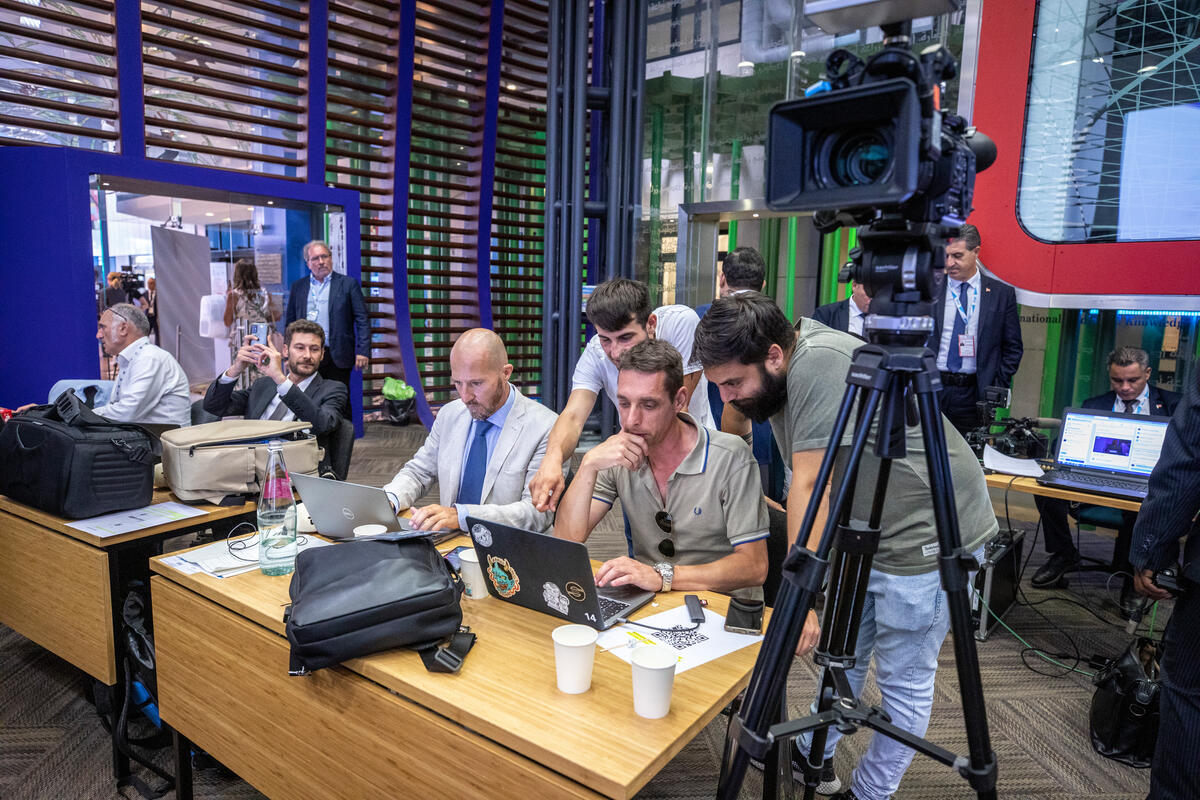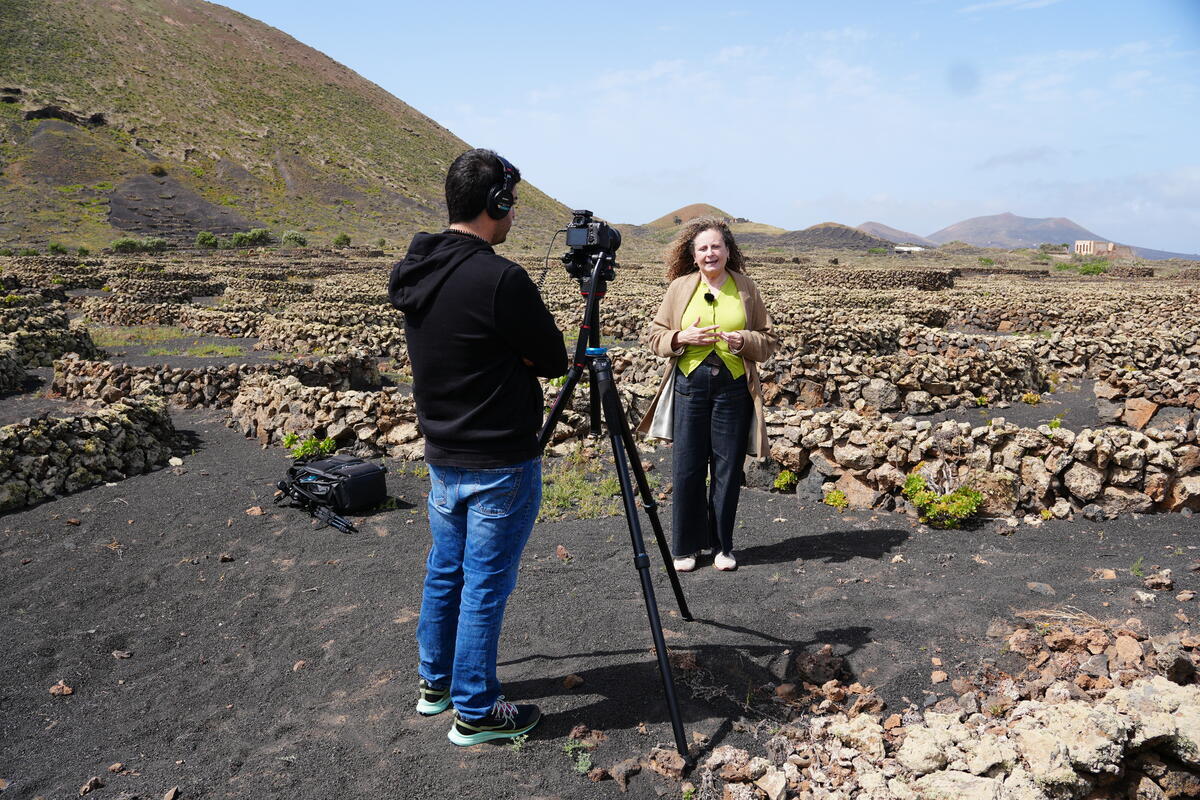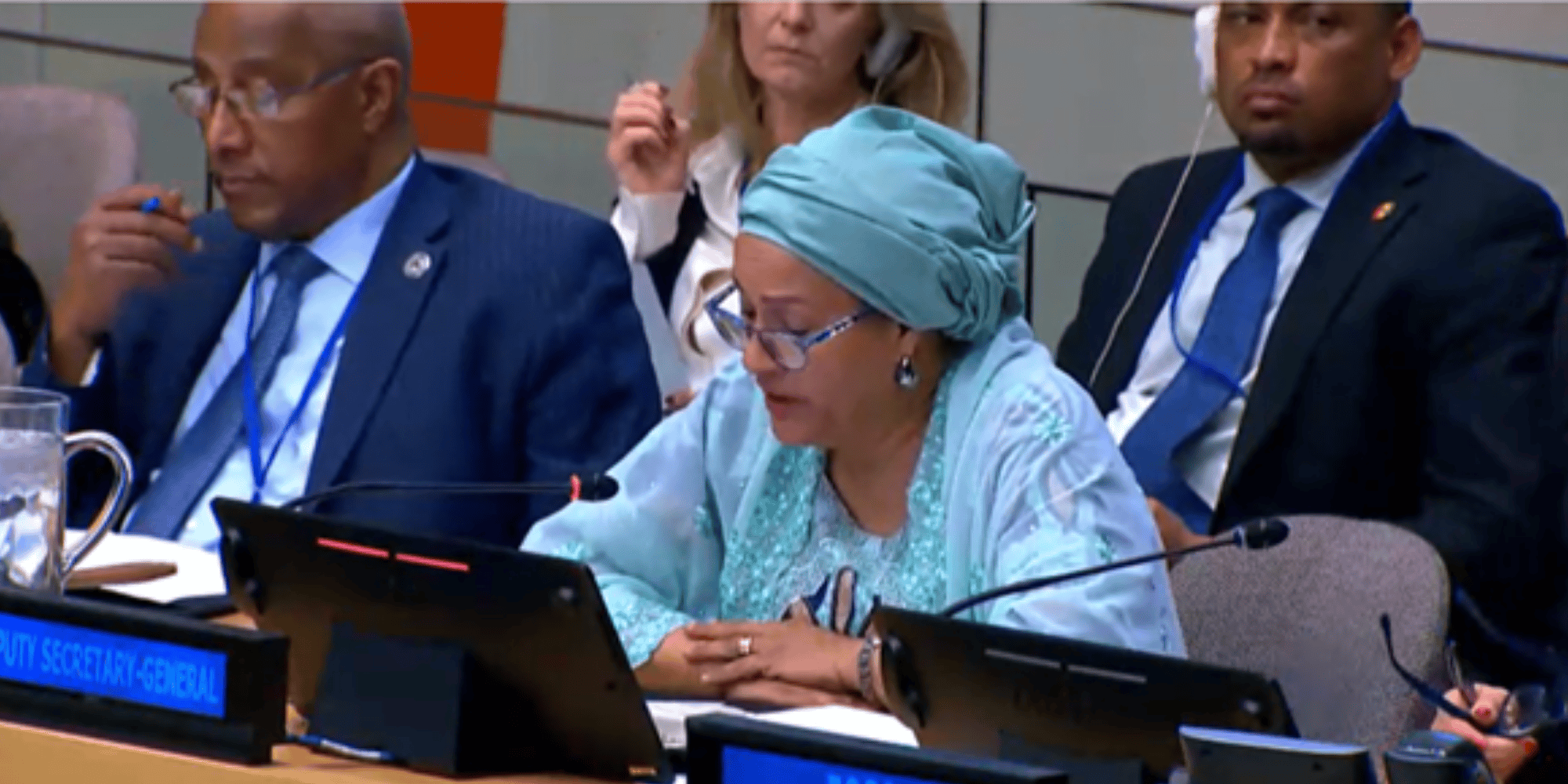Press and Media
This section offers an overview about press and media at the UN Food Systems Summit +4 Stocktake and provides information relevant to media representatives.
 | Register your attendance at UNFSS+4 (27-29 July 2025, Addis Ababa, Ethiopia) and get accredited here. Explore the UNECA Campus in Addis Ababa, Ethiopia – Rooms and Layout: Facilities | United Nations Economic Commission for Africa |
 | Live Coverage: Will be livestreamed on UN Web TV. Media Alerts: Press briefings and other events open to media – to come. |
Media Advisory
UN Food Systems Summit +4 Stocktake (UNFSS+4)
A Global Turning Point for Food, Climate, and Equity
Addis Ababa, Ethiopia | 27–29 July 2025
ADDIS ABABA / ROME — 13 June 2025
The United Nations will convene the UN Food Systems Summit +4 Stocktake (UNFSS+4) from 27–29 July 2025 at the United Nations Economic Commission for Africa (UNECA) in Addis Ababa, Ethiopia – bringing together heads of state, ministers, scientists, producers, Indigenous leaders, youth, and civil society from around the world.
This is more than a summit. It’s a reality check. With just five years left to meet the 2030 Agenda, the world is off track on hunger, nutrition, and sustainability. Yet from the Sahel to Southeast Asia, countries are making bold commitments and leading innovations to transform how food is grown, distributed, and consumed – across climate, health, equity, and economic recovery.
Register your attendance and get accredited here.
Why it matters for media:
- It’s a global stocktake with teeth: Every two years, UNFSS+4 measures real progress on food systems transformation. This is a frontline moment of accountability and leadership.
- It’s hosted in Africa: For the first time, the Summit is held in Africa – a region leading the charge in resilient, sustainable food strategies.
- It’s where food meets climate, conflict, and development: From fragile states to thriving farm innovations, this is a story of challenge and momentum.
- It’s powered by people, not just policy: Youth, Indigenous Peoples, women, and producers are shaping the agenda and outcomes.
Journalists will have access to:
- High-level briefings and interviews with UN officials, ministers, and grassroots leaders.
- Field visits (July 27) showcasing community-led solutions.
- On-site and virtual Media Lab at UNECA, offering daily insights and media kits.
- Press conferences, photo opportunities, and real-time updates.
Event at a Glance:
- Action Day + Field Visits: 27 July
- High-Level Stocktake Sessions: 28–29 July at UNECA
- Live Media Lab Access (on-site)
More information, updates, and accreditation details here.
For media access to UNECA events, please contact: Sophia Denekew [email protected]
Event Website: https://www.unfoodsystemshub.org/un-food-systems-summit-4-stocktake/en
Media Advisory - 27 July 2025
UNFSS+4 Officially Kicks Off Tomorrow, July 28, with High-Level Opening
Addis Ababa, 27 July 2025 – The United Nations Food Systems Summit +4 (UNFSS+4) Stocktake officially opens tomorrow, 28 July 2025, with a High-Level Opening Session, marking the start of a pivotal global convening to assess progress toward transforming food systems in support of the 2030 Agenda.
WHEN:
- Monday, 28 July 2025
- High-Level Opening | 9:00 AM EDT
NOTE TO ACCREDITED MEDIA:
- All accredited media will be required to remain seated in Press Galleries 1 and 2 on the 2nd floor for the entire duration of the ceremony. Conference Room 2 will also carry a live feed.
WHERE TO WATCH:
- UN Web TV Live Broadcast: https://webtv.un.org/en/schedule/2025-07-28
- YouTube (UN Food Systems Coordination Hub): UNFSS YouTube Channel
Highlights From Action Day – July 27
On Action Day, 27 July, stakeholders across the globe convened for dynamic dialogues, activations, and knowledge sharing to set the tone for the UNFSS+4 summit. Key moments included:
- Young People as Changemakers: How Art and Creativity Are Driving Change and Sustainable Food Systems
Hosted by the UN SDG Action Campaign, this standout event spotlighted the power of youth-led innovation, culture, and storytelling to reimagine food systems.
Event Details: Read More - Additional Action Day sessions are highlighted here:
Action Day Programme
Coming Up: Launch of the SOFI 2025 Report
Also on 28 July, a special UNFSS+4 event will feature the launch of the 2025 edition of The State of Food Security and Nutrition in the World (SOFI) report, providing critical data and insights into global hunger and nutrition trends.
Details: The State of Food Security and Nutrition in the World
Join the global conversation and follow along using #UNFSS2025 and #FoodSystems.
For updates, visit: https://www.unfoodsystemshub.org/
Media Advisory - 04 July 2025
UN Food Systems Summit +4 Stocktake: Three Weeks Out – Draft Programme and High-Level Participation Announced
Addis Ababa, Ethiopia 27–29 July 2025
With just three weeks to go, preparations are accelerating for the UN Food Systems Summit +4 (UNFSS+4) Stocktake, set to take place from 27 to 29 July 2025 in Addis Ababa, Ethiopia.
Media accreditation is now open and will close on 10 July 2025. Journalists interested in covering the event on site should register via the official portal: https://indico.un.org/event/1018311/registrations/
Key Highlights
- The Prime Ministers of Ethiopia and Italy, co-hosts of the Summit, will attend alongside the Deputy Secretary-General Amina J. Mohammed.
- Several Heads of State and Government are expected, reflecting the growing political commitment to transforming food systems for people, planet, and prosperity.
- The Summit’s draft programme is now available and features high-level dialogues, regional roundtables, spotlight sessions, and special events: Download the draft programme (PDF)
A Milestone for Accountability, Investment and Inclusivity
UNFSS+4 comes at a critical mid-point on the path to the 2030 Agenda for Sustainable Development. With hunger, inequality, and climate pressures rising, the Summit will take stock of national progress since the inaugural 2021 Food Systems Summit – and chart a path forward through greater accountability, targeted investment, and inclusive action.
The event is the culmination of months of global engagement, including:
- Regional preparatory meetings in Asia and the Pacific, Africa, Europe and Central Asia, Latin America and the Caribbean, and the Arab Region;
- Over 100 national stocktaking reports;
- The dynamic Preparatory Youth Conference in Bangkok;
- Extensive consultations with civil society, Indigenous Peoples, producers, and the private sector.
From Addis to the World
The outcomes of UNFSS+4 will inform a series of critical global moments in 2025 – from the World Food Forum and COP30 in Brazil, to the UN Environment Assembly and the World Social Summit – cementing food systems as foundational to climate, economic, and health agendas.
This is a chance to drive tangible progress where it matters most.
For media access to UNECA events, please contact: Sophia Denekew [email protected]
Event Website: https://www.unfoodsystemshub.org/un-food-systems-summit-4-stocktake/en
Press Release
Addis Ababa, 29 July 2025
UNFSS +4 Concludes in Addis Ababa, Reaffirming Global Unity on Food Systems Transformation
The Second United Nations Food Systems Summit Stocktake (UNFSS +4) – held 27–29 July 2025 in Addis Ababa, co‑hosted by Ethiopia and Italy – closed today with a powerful reaffirmation of political will, partnership, and accountability in support of sustainable, inclusive, and resilient global food systems transformation.
UNFSS+4 brought together 3,500+ participants, 145+ national delegations and 700+ non-state actors. Participants from across governments, civil society, producers, youth, Indigenous Peoples, academia, and the private sector gathered for Plenary sessions, High-level Panels, Ministerial Roundtables, Investment Dialogues, and Stakeholder-led constituencies. The final closing plenary tied together global priorities with national action plans and key accelerators for progress over the next two years toward 2030 goals.
Achieving Results: From Vision to Action
Day 2 of the Summit (29 July) showcased how high-level commitments are being translated into measurable progress. A series of high-impact sessions and announcements underscored the momentum behind food systems transformation:
- Investment Dialogues introduced innovative financing models, including public–private partnerships, climate-smart investments, and AI-driven data solutions, all designed to drive inclusive, system-wide transformation.
- Constituency-led sessions – from youth, Indigenous Peoples, producers and others – generated grounded insights and actionable solutions drawn from lived experience and local knowledge.
- Transforming Food Systems Together: Aligning Action, Investment and Accountability spotlighted the urgent need for increased, well-targeted investment and policy coherence – bridging the persistent gap between global ambition and local implementation.
- A major commitment was announced following the Investment Pitch for Cameroon: the Global Flagship Initiative for Food Security (GFIFS) confirmed its intent to partner with the Joint SDG Fund to significantly scale up programmes starting with Cameroon’s food value chains. GFIFS will expand this effort to additional countries, working closely with UN Resident Coordinators. The formal launch of this large-scale commitment is slated for Science Week in New York, September 2025.
Shared Themes
- Food systems are central – not peripheral – to achieving health, equity, climate resilience, and peace. Poor nutrition is often both cause and consequence of broader crises.
- Inclusive governance and multi‑stakeholder accountability remain essential, ensuring that women, youth, Indigenous communities, and smallholder producers shape change.
- Finance is critical, and must be smart, catalytic, and accessible – leveraging digital tools, data-driven planning, and new risk-sharing models.
- Science, innovation and data are now strategic tools in tracking progress, targeting interventions, and scaling effective practices.
Context and Imperative
As the world faces escalating climate chaos, geopolitical instability, and surging hunger, leaders echoed urgent calls for action. The UN Secretary-General’s message resonates beyond food systems: “The hidden costs of our food systems – on health, nature, and human suffering – exceed $10 trillion a year.”
And at the same time, “Too often food systems are seen as a part of our challenges, when they can be one of the greatest solutions,” said UN Deputy Secretary-General Amina J. Mohammed in her closing session remarks – “to deliver for people, for planet, for peace, and for prosperity.”
Looking Ahead: Building on UNFSS +4 Momentum
UNFSS +4 marks a pivotal mid-point in the race to 2030 – serving as a global reality check and a source of renewed energy and cooperation. Key commitments moving forward include:
- Embedding food systems strategies across national development plans and climate frameworks.
- Strengthening accountability mechanisms across UN, national, and local levels.
- Scaling financial instruments – especially targeting smallholder resilience, climate adaptation, and youth entrepreneurship.
- Deepening data‑driven decision‑making and innovation partnerships.
The outcomes from this Summit will feed into upcoming global forums: the UN General Assembly, World Food Forum, COP 30, and other critical international gatherings in the coming months. UNFSS +4 has demonstrated that when diverse voices come together, shared vision becomes durable action. As the Summit concludes in Addis Ababa, we move forward with renewed resolve – united in purpose and reminded that food systems transformation is both essential and achievable.
Media Contacts:
Sophia Denekew [email protected]
Press Release
Addis Ababa, 28 July 2025
Global Leaders Convene in Addis Ababa to Launch UN Food Systems Summit +4
UNFSS+4 kicks off with calls for accountability, bold action, and investment to transform food systems by 2030
The second UN Food Systems Summit Stocktake (UNFSS+4) opened today in Addis Ababa, co-hosted by the Government of Ethiopia and Government of Italy, in collaboration with the United Nations Food Systems Coordination Hub. The summit brings together more than 2,500 delegates including heads of state, ministers, civil society, youth, and food producers to assess global progress and reinvigorate commitment toward equitable, sustainable, and resilient food systems.
Held at the UNECA headquarters, the high-level opening ceremony featured remarks by H.E. Abiy Ahmed Ali, Prime Minister of Ethiopia; H.E. Giorgia Meloni, Prime Minister of Italy; the Presidents of Kenya, Somalia and Comoros. “Today, we reflect on the progress made and recommit to urgent and coordinated action, said Prime Minister Abiy Ahmed. “We would be making a serious mistake if we limited ourselves to looking at food systems through the face of poverty, suffering, and hunger. Food systems are an engine of growth and development,” said Prime Minister Giorgia Meloni.
The Day 1 programme included regional spotlights, ministerial dialogues, and the official launch of the State of Food Security and Nutrition in the World (SOFI) 2025 report, which shows rising urgency to address hunger, malnutrition, and fragile agri-food systems in the face of climate shocks and economic inequality.
Delegates emphasized three core objectives:
- Taking stock of progress on national food system pathways launched since the 2021 UNFSS.
- Strengthening partnerships, particularly with youth, women, and Indigenous Peoples.
- Unlocking investment to scale innovation, resilience, and inclusive governance.
The UN Food Systems Coordination Hub presented its latest analysis across over 100 country pathways, while stakeholder panels spotlighted transformative practices from Ethiopia, Brazil, Indonesia, and beyond. Preparatory dialogues held earlier this year in Nairobi, Bangkok, Beirut, Geneva, and Santiago have fed into today's framing.
“What we need is the determination to act at the speed, and scale, the moment demands,” said UN Deputy Secretary-General Amina J. Mohammed. “The time for ambition and solidarity is now.”
The summit runs through 29 July and includes plenary dialogues, investment pitches, field visits, and an Action Day focused on country-level delivery. The final day will outline a road map toward critical milestones and the 2030 SDG deadline.
Media Contacts:
Sophia Denekew [email protected]
For programme updates and resources: https://www.unfoodsystemshub.org/un-food-systems-summit-4-stocktake and Media Resource Hub – UNFSS+4
 | Latest news: https://www.unfoodsystemshub.org/latest-updates/news/ |
 | Programa de UNFSS+4: UNFSS+4 Programme |
 | Multimedia assets: UNFSS+4 Trello; FAO Digital Media Hub |
 | Communications Overview: UNFSS+4 Communications and Advocacy Presentation |
 | Sample impact stories: High Impact Joint Programmes |
 |
 | On Social Media: |
UNFSS+4 briefings set the stage for a transformative Stocktake in 2025

Ahead of the second UN Food Systems Summit Stocktake (UNFSS+4), the UN, in collaboration with the Stocktake co-hosts – Ethiopia and Italy – convened Member States for a series of briefings. The briefings set the direction of travel, and emphasized urgency and a strong focus on collaboration and investment to build momentum for the acceleration of global food systems transformation. These briefings, along with discussions among non-state stakeholders, underscored the urgency of the Stocktake, scheduled for 28–29 July 2025 in Addis Ababa, Ethiopia.
Briefings with Member States
Two Member State briefings were held on 18 and 24 February, in New York and Nairobi respectively, with remote participation from Rome and Geneva. The UN Deputy Secretary-General (DSG) hosted the meetings, joined by high-level representatives from the governments of Ethiopia and Italy, and key UN agencies (FAO, IFAD, WFP, UNEP, UNON), for discussions around the UNFSS+4 vision, objectives, roadmap, and expected outcomes. The discussions reiterated the urgency of collective action in the face of climate change, conflict, economic disparities, and food insecurity during a time of polycrises. The DSG underscored the need to motivate investment in food systems that would help address and overcome these challenges.
Briefing with National Food Systems Convenors
Joined by over 90 participants from 58 countries, the National Convenor Briefing, held on 24 February 2025 in Nairobi, Kenya, reinforced the critical role of National Convenors in driving food systems transformation at the country level. The DSG underscored that food systems transformation is at a turning point, with only five years remaining to meet the 2030 Sustainable Development Goals (SDGs). She urged National Convenors to move beyond best practices and focus on investment mobilization, policy coherence, and knowledge-sharing to drive measurable change. She also emphasized private sector engagement and digital innovation as key enablers of scaling sustainable food systems solutions.
FAO Director-General Qu Dongyu reaffirmed FAO’s commitment to supporting National Convenors, describing them as the "real game changers" who translate global strategies into local action. He emphasized the need for technological innovation, climate-smart agriculture, and stronger data-driven decision-making to accelerate food systems transformation.
IFAD President Alvaro Lario highlighted the urgent need for increased investment, calling for greater financial inclusion for smallholder farmers and new funding mechanisms to support national food security initiatives.
National Convenors shared progress updates, highlighting successes in scaling up school feeding programs, expanding digital agriculture services, and strengthening public-private partnerships. However, many also cited financial constraints, limited access to technology, and the need for stronger multi-sectoral coordination as ongoing challenges. Some countries called for better alignment between food systems strategies and broader economic development goals to ensure long-term sustainability.
The briefing concluded with a robust roadmap toward UNFSS+4, including finalizing voluntary national progress reports, conducting regional consultations, and engaging stakeholders. With the Stocktake fast approaching, National Convenors were encouraged to seize this opportunity to drive real investment and policy action, ensuring that UNFSS+4 delivers tangible progress toward more sustainable, resilient, and inclusive food systems. Read the summary report.
Briefing with private sector actors
The DSG met with private sector thought leaders to share updates on the UNFSS+4 process. The private sector reaffirmed their commitment to support the Stocktake's success, discussed initial potential entry points for engagement, and offered insights and recommendations to enhance their involvement leading up to and during the event. Overall, they welcomed the space for meaningful engagement of the private sector and exploring options for investment partnerships and good practice that can be featured at the Stocktake.
UNFSS+4 kick-off briefing
On 25 February, a kick off meeting brought together representatives from civil society, academia, youth, science, farmer organisations and the private sector to inform the design of the Summit and priority issues including mobilizing international and regional financial institutions and banks, engaging various actors including the private sector, youth and academia, social movements, and collecting their perspectives, and accelerating food systems transformation through a human rights lens.
The road ahead
The UNFSS+4 Stocktake is shaping up to be a defining moment for accelerated action for food system transformation. Over the next few months, regional consultations – including the UNFSS+4 Regional Preparatory Meetings, a Preparatory Youth Conference, a Pre-Summit moment, virtual touchpoints, and national reports will offer milestones and inform the UNFSS+4 programme in Addis Ababa.
With a strong focus on inclusivity, accountability, and investment, the UNFSS+4 aims to bridge policy commitments with real-world implementation, ensuring that food systems transformation remains at the forefront of the global agenda.
